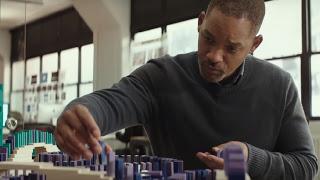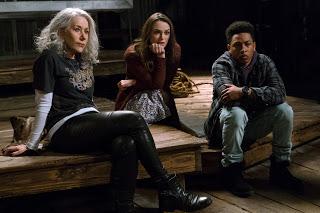 Awhile back, Will Smith decided to shed his Fresh Prince/Men in Black persona and become a serious actor. It's an understandable impulse shared by many stars, but Smith's been spectacularly bad at it. At best, Smith's efforts result in earnest but underwhelming dramas like Ali and Concussion. At worst, there's Seven Pounds, where Smith's character commits suicide by jellyfish to give Woody Harrelson new eyeballs.
Awhile back, Will Smith decided to shed his Fresh Prince/Men in Black persona and become a serious actor. It's an understandable impulse shared by many stars, but Smith's been spectacularly bad at it. At best, Smith's efforts result in earnest but underwhelming dramas like Ali and Concussion. At worst, there's Seven Pounds, where Smith's character commits suicide by jellyfish to give Woody Harrelson new eyeballs. That movie's cnidarian treacliness has nothing on Collateral Beauty (2016), which received the sort of reviews usually reserved for scat porn or Transformers sequels. David Frankel's film is utterly misguided tripe, trying to uplift the audience through one of the most baffling plots in cinema history.
Howard Inlet (Will Smith) goes from successful advertising executive to chronically depressed after losing his daughter. His business partners - Whit (Edward Norton), Claire (Kate Winslett) and Simon (Michael Pena) - worry about their company going bankrupt, so they hatch a devious scheme. They hire a trio of struggling actors (Helen Mirren, Keira Knightley and Jacob Latimore) to impersonate Death, Love and Time, in order to either snap Howard back into reality or else prove he's insane. Naturally, the three businesspeople find their own lives improved by interacting with these impish performers.
Just skimming that synopsis shows where Collateral Beauty goes wrong. The movie amounts to corporate cutthroats gaslighting their depressed partner into believing he's insane, in order to steal his business. That storyline might work in a Neil LaBute film or an August Strindberg play, where the protagonists are intentionally hateful monsters. In a movie designed as a crowd-pleasing tearjerker, no amount of Magic Realism, faux-whimsy or pseudo-uplifting platitudes can make it palatable.
 But oh, how Frankel and writer Allan Loeb try! Collateral Beauty works so hard to make its protagonists endearing rather than evil, giving them pathetic little backstories to win our sympathy. Poor Whit struggles to overcome his womanizing ways and win back his daughter (Kylie Rogers); Simon conceals a terminal illness; Claire frets over her biological clock. These little vignettes are pathetically one-dimensional, with the Actors resolving them through heartfelt sentiments you'd find on a gas station greeting card.
But oh, how Frankel and writer Allan Loeb try! Collateral Beauty works so hard to make its protagonists endearing rather than evil, giving them pathetic little backstories to win our sympathy. Poor Whit struggles to overcome his womanizing ways and win back his daughter (Kylie Rogers); Simon conceals a terminal illness; Claire frets over her biological clock. These little vignettes are pathetically one-dimensional, with the Actors resolving them through heartfelt sentiments you'd find on a gas station greeting card.Besides the above-named stars, utterly unable to grapple with their absurd characters, there's also Naomie Harris as a therapist who slowly warms to Howard. Their story arc leads to a nauseating monolog where Harris's character tries to explain the title phrase, blathering for five minutes without clarifying what the hell she's blathering about. Her sob story telegraphs one of the dumbest twists in cinema history, intended as heartbreaking but incurably stupid. This dovetails with our gradual realization that the actors might be angels or something. Which leaves us wondering what use these otherworldly beings have for the handsome cash payouts they receive, or whether angels regularly skateboard.
It's hard to feel bad for Smith, who's spent years sabotaging his own career with ill-conceived ego trips. No amount of domino-stacking or bike-riding montages make us care about Howard, his troubles conveyed by Smith in drab, one-note sullenness. But one seriously wonders about Norton, Mirren and the rest, all gifted actors, many recent award-winners, wasting their talents on such a garbage movie. No one forced them at gunpoint to appear in this movie, so what gives?
Or maybe they did. Perhaps Smith, bummed out by his inability to win an Oscar or craft his talentless children into stars, kidnapped the cast and crew, forcing them under pain of death to perform the fever dream he transcribed in earwax on the back of a Post-It note. At the very least, that scenario would make a much better movie than Collateral Beauty.

